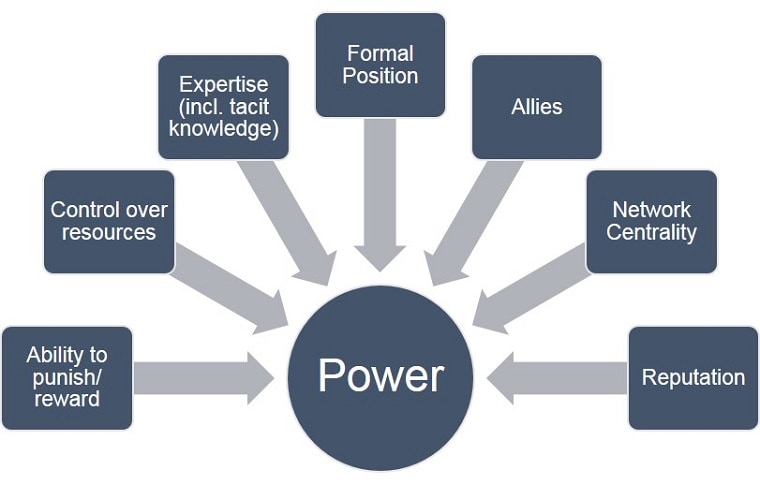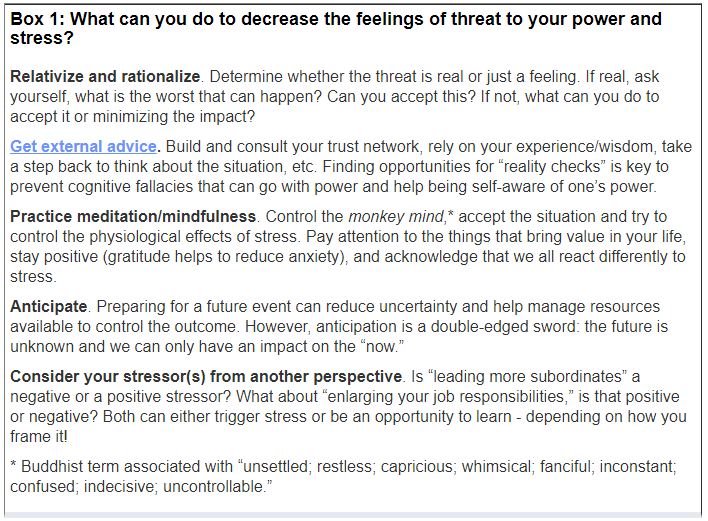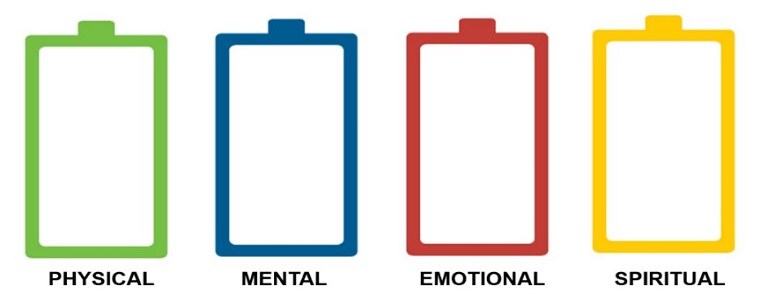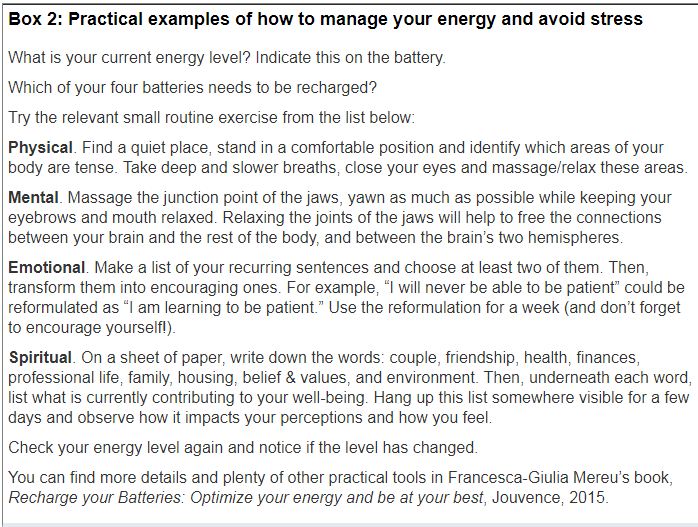Power, stress and your leadership
Stress is recognized worldwide as a major challenge to workers' health and well-being


 Image: Shutterstock In a recent Discovery Event, participants discovered how being in a powerful position influences stress and behaviors in the workplace. While power reduces stress, a perceived threat to this power can have the opposite effect. This, in turn, can affect risk preferences, power sharing and how you inspire and motivate your team. Participants learned a few simple tools to identify stress triggers and manage their stress and energy levels to continue to lead effectively, even in challenging times.
Image: Shutterstock In a recent Discovery Event, participants discovered how being in a powerful position influences stress and behaviors in the workplace. While power reduces stress, a perceived threat to this power can have the opposite effect. This, in turn, can affect risk preferences, power sharing and how you inspire and motivate your team. Participants learned a few simple tools to identify stress triggers and manage their stress and energy levels to continue to lead effectively, even in challenging times.
Stress is recognized worldwide as a major challenge to workers’ health and well-being. In times of turbulence and uncertainty, this burden can be even more difficult to carry. Breaking the habitual responses to stress is not easy (and coffee or energy drinks are not much help!). However, a better understanding of how to protect yourself against the negative effects of stress is critical not only for yourself but also for your team. As we are going to discover, power and stress might be negatively affecting your behavior at work and, thus, your leadership.
What is power?
A common definition of power is the capacity to influence your environment and take decisions. From a broader perspective, power is measured as your control over valued outcomes or resources. As illustrated in Figure 1, power can be endowed by others (through networks, reputation, allies, etc.) or it can come from your expertise, your ability to punish and reward, your charisma.
 Figure 1: Sources of power
Figure 1: Sources of power
Although both power and leadership involve influence, power is neither a necessary nor a sufficient condition for leadership to exist. But status, which refers to how much others acknowledge your power, plays a key role in allowing leadership to happen. For example, Nelson Mandela still managed to motivate others to fight against apartheid when he was in prison and had no control over any resources.
What is the link between power and stress?
On a scale from 1 to 7, how much stress do you currently feel in your job? A score of 1 would mean you are as cool as a cucumber, while a score of 7 would mean you are like a volcano ready to erupt. How do you think your power affects your perceived level of stress? On the one hand, the ever-increasing demands and pressure to meet the expectations that often come with powerful positions can cause more stress. On the other hand, one can also argue that because leaders have access to and control over more resources, they experience a higher sense of control, which in fine translates into less stress. Indeed, research indicates that power reduces stress.
However, if that power comes under threat (for example when your job is no longer secure) the story can be quite different. In her research, Professor Jennifer Jordan demonstrated that a perceived threat to power induces stress, but only if you value hierarchy. Hence, a lot of how people experience stress is based on how they construe the world around them.
How do power and stress relate to your leadership?
Possessing and experiencing power is associated with several positive effects (e.g. less distrust in the organization and work stress, but more action, optimism, abstract thinking and goal-directed behavior). However, when it is destabilized, it can have adverse consequences, such as more distrust in the organization and work stress… but not only:
Risk taking: Powerful people are deemed more likely to take greater risks and resort to risky negotiation tactics. Lack of attention to potential dangers and the search for rewards are the two main elements that encourage powerful people to engage in risky behaviors. However, Professor Jordan’s lab experiments showed that only powerful people who are in an unstable situation and have a low tolerance to stress engage in more risky behaviors.
Power sharing: A power threat can also affect how much a leader will allow their subordinates to influence/participate in decision making. Interestingly, the negative relationship observed between a power threat and power sharing (as reported by subordinates) is driven by distrust in the organization. In other words, a leader who feels that they risk losing their power is less likely to share their power because of a lack of trust in people in the organization.
Transformational leadership: Finally, a power threat also influences how leaders inspire and motivate their troops. Research suggests that the greater the threat to power, the less a leader applies transformational leadership (i.e. leading by doing, inspiring, fostering collaboration among work groups, etc.). In other words, when a leader feels their power is threatened, they go into a sort of “survivor mode” and effectively stop leading. This, however, is completely explained by work stress, which is not the case for directive leadership.
So, when you feel that your power is threatened, it not only increases your stress level, it also affects how you behave as a leader. Box 1 lists some tips to help you minimize this feeling and reduce your stress.

What can you do for your team?
Stress is contagious, so it is important to prevent your own stress from cascading to your team to safeguard their performance and well-being. One way to do this is by being mindful of the physical and psychological resources that you are providing your subordinates with during unstable times. Are they being asked to do too much with too little? Are they aware of the uncertainty around them? And if so, how can you reduce their stress? Being able and willing to see yourself through others’ eyes is a key leadership attribute. And while being authentic with your team might help you lead effectively in general, it can backfire when it comes to sharing your stress. You need to find a balance between showing your true self and avoiding the negative effects that this could entail if you contaminate your team with your stress. Your subordinates are unlikely to perceive you as disingenuous if you refrain from sharing something for their good. That said, you do need someone with whom you can share your stress and fears within the organization. This is where your trust cabinet is even more important. Overall, maintaining stability within your team and reducing uncertainty can then be crucial in a stressful context.
Learn to manage your energy
Preventing stress can be difficult. But, according to Francesca-Giulia Mereu, Coach in leadership and personal energy management, it is possible to do so to some extent by managing your own energy. A person’s total energy comes from four dimensions, referred to as batteries:
Physical (general health and vitality)
Mental (ability to process information, clarity and focus)
Emotional (resilience and emotional self-regulation)
Spiritual (values and purpose in life).
 Figure 2: The four dimensions of your energy
Figure 2: The four dimensions of your energy
These four batteries are interrelated. Everyone has a battery that depletes faster than the others, and one that charges faster. This may vary depending on the context. For example, imagine you’ve been focusing all day on writing a report. At last, you are pleased with it and send it off to your boss, who congratulates you on a job well done. As you have been seated all day, your physical battery would still be charged, but your mental one may be depleted from an extended period of concentration. Your emotional and spiritual batteries may be boosted by your sense of achievement and your boss’s appraisal.
People are often good at managing one battery and not another. Think of energy as water that evolves and fluctuates. You cannot be fully charged all the time and of course, you would not want all your batteries to be depleted for any length of time. You need to find your happy fluctuation zone by optimizing your energy within your specific constraints. To do so, you first need to observe the levels of your different batteries and how they are impacted in different situations. It is important to learn to recognize the early signs of a battery depletion or overcharge (e.g. are you smiling less, feeling tense, have headaches?) and which of your batteries recharge or drain fastest. Then, identify two key points to better manage those batteries. For example, is a person, an activity or a memory sapping your energy? When you lack sleep, does it trigger a domino effect? What could you do to avoid these situations? To help you, why not try the tools provided in Box 2. Learning to manage your energy will help you sustain and increase your performance and quality of life and reduce your stress, which in turn will help you be a stronger and more effective leader.

The power of mini-habits
Professional athletes know that recovery is key to long-term success. Indeed, it is common knowledge that regular exercise is good for your health, strengthens your self-esteem, and allows your body to dissipate stress hormones. Yet, this is often the first item that people drop from their to-do list. Preventing stress is not easy, but slight changes can trigger bigger changes. Introducing a mini-habit in your daily life could be that trigger, a first step to implement a new behavior. A mini-habit is a small action that is meaningful to you (i.e. related to something you would like to improve) and that you can do even when you are tired. What behaviors would you like to establish/change? Why is it important for you? Think about an action that you can add to a routine you already have and that will contribute to implement this new behavior, then write it down. For example, AFTER I … (e.g. brush my teeth), I WILL… (do my mini-habit: drink a glass of water, do some stretching exercises, etc.), THEN I WILL… (have a mini celebration).
Finally, it is important to not let your current stress level become your new “normal.” Keep in mind that everyone is different, has their specific needs and perceives things in their own way. Being aware of these differences can already help you better understand your environment and yourself.
Key takeaways
Power lowers stress, but its instability increases stress. It is also important to be self-aware of your power and how it impacts your behaviors and subordinates.
Stress is contagious and can quickly cascade to your team. Being fully authentic might not always be the best option. Reducing uncertainty and maintaining stability are critical to reduce stress within your team.
Being able to anticipate bad events, when relevant, reduces uncertainty and stress. But over-anticipating hypothetical events that may never occur can increase stress levels.
Your energy level can be divided into four components: physical, mental, emotional and spiritual. Learning what your chargers and drainers are and taking action to avoid excessive battery leakage will help you optimize your energy.
There are plenty of tools available to help you better manage your energy. It’s just a matter of finding those that suit you best and using them.
Remember, stress is a choice! As the Dalai Lama says: “If a problem is fixable, if a situation is such that you can do something about it, then there is no need to worry. If it’s not fixable, then there is no help in worrying. There is no benefit in worrying whatsoever.”
First Published: Jan 05, 2018, 08:14
Subscribe Now